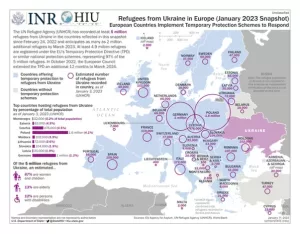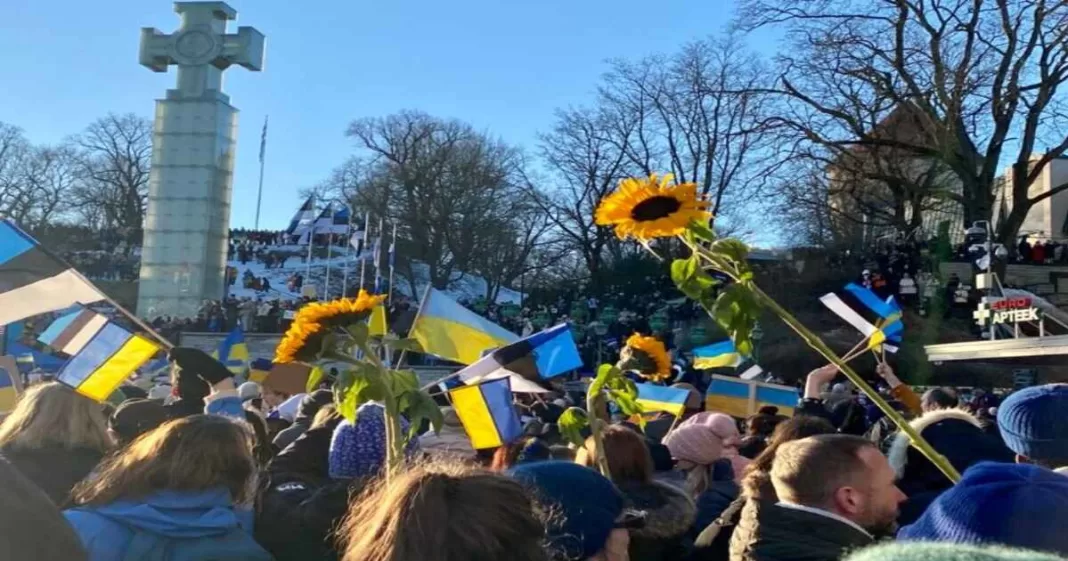|Syed Rasalat Raza Naqvi
It’s been eight months since I moved to Estonia, a small Baltic but highly advanced and liberalized Eastern European democratic country, for the pursuit of my masters degree in International Relations from the University of Tartu, one of the finest higher education research institutions in the European continent.
Estonia is a post-Soviet, Baltic, European state which gained independence from USSR in 1991 and officially joined European Union in 2004, and the Schengen VISA area in 2007 and has also been a NATO member state since 2004. Hence as s US ally, it is a proper liberal democracy directly bordering Russia, which also shelters a lot of Russian-speaking population as well.
The 24th Feb 2022 is considered the darkest day in recent European history when Russian President Vladimir Putin announced a full-scale invasion of Ukraine, and the Western world witnessed horrifying scenes of bombing and destruction of Ukrainian cities, which resulted in a migration of hundreds of thousands of Ukrainians into neighboring EU Member States.
Read more: Russia Ukraine War: What are the lessons for Pakistan?
Most of the Ukrainians fled to Poland, Germany, the Czech Republic, the United States, the United Kingdom, and other central European countries, but three small Baltic states Estonia, Latvia, and Lithuania also hosted thousands of Ukrainian refugees. These three countries are small Nations with a population of 1.3 million in Estonia, 1.9 million in Latvia, and 2.8 million in Lithuania.
If we see the stats of Ukrainian migrants in these countries, Estonia hosted around 65 thousand refugees, Latvia gave shelter to 35 thousand refugees and 72 thousand Ukrainian refugees fled to Lithuania for their lives, and the number is still increasing even though it’s been around 15 months since the war broke out in Ukraine.
Apparently, these figures are not too high, but if we compare them to the actual population and GDP of these states, these refugees are definitely a burden on taxpayers’ money in these countries, however, I was amazed to see how open-heartedly they welcomed Ukrainian refugees, and the way the cried and yearned for them, it is unprecedented for anyone in recent European history.

Estonia’s reaction towards Russian aggression in Ukraine
The first and foremost reaction came from the Estonian population in the shape of emotionally motivated protests outside the Russian embassy in Tallinn, the capital of Estonia. A sudden wave of extreme hate against Russia and President Putin emerged in the Estonian population and political sphere, and the President of Estonia Alar Karis called this attack groundless and criminal in his tweet.

Suddenly, a huge protest broke out in all the cities of Estonia and thousands of protesters appeared on the roads of Tallinn and in front of the Russian embassy showing their anger and hate on Russian authorities for doing innocent atrocities in Ukraine. They immediately banned their airspace for Russian airplanes saying that aggressors have no right to play in democratic skies, and on the 27th of February, we saw that the EU officially banned their airspace for Russia and said that more and stronger consequences are to follow.
Furthermore, Estonia released 1 million euros in immediate financial aid to Ukraine on the 3rd of March, 2022, and 6 million euros were raised countrywide to help Ukraine till the 5th of March, 2022, and till 11th of March, their financial and military aid to Ukraine crossed 220 million euros, according to the Ministry of Defence of Estonia.
Read more: Russia Ukraine Conflict: The past and the future
On the 24th of March, Estonian authorities decided to increase their defense spending up to 2.5% of their GDP, which equals around 600 million euros. On the 7th of April 2022, they decided not to import natural gas from Russia, which was a bold and brave decision knowing the fact that winter is coming and Estonia usually faces extremely cold winters, where the temperature drops to -20 degree Celsius.
On the 19th of May, Estonia was the first NATO member state to approve Finland and Sweden’s request to join NATO. Another major development happened on the 18th of October when the Estonian parliament officially passed a resolution to declare Russia a terrorist state followed by Latvia and Lithuania.
On 9th September, Estonia banned Russian passport holders from entering Estonian territory, and on 1st of December, 2022, it announced a donation of a field hospital to Ukraine alongside Norway and the Netherlands. Lastly, on 4th April 2023, Estonia welcomed its best ally and friend Finland to NATO since it played a key role in the Finish accession process.
Despite the extreme wave of inflation, increase in energy prices, and petroleum products in the last 15 months, Estonians are doing anything possible that can help Ukraine and the Ukrainian people. Their anger and hate against Russia can be seen in that you are not allowed to raise the Russian flag publically, you are banned to praise Russia and Putin in any way.
Estonia & Ukraine: A strong sense of camaraderie prevails
The Estonian people’s love for Ukraine is deep and strong, especially in the context of the ongoing war with Russia. Estonia has a long history of oppression and occupation by foreign powers, so it can understand Ukraine’s struggle.
Estonians have always sympathized with the plight of Ukrainians, who have faced many difficulties and sufferings as a result of the conflict. Many Estonians even volunteered to fight alongside Ukrainian soldiers or donated money and materials to help alleviate some of the suffering caused by the war.
Emotions are heightened by this, as Estonians feel a strong sense of camaraderie and solidarity with their Ukrainian brothers and sisters, as well as a deep sense of anger and frustration towards Russia for its role. country in prolonging the conflict.
Read more: ‘Crazy’ that Russia and Ukraine still trade – Seymour Hersh
For Estonians, the war in Ukraine is personal, as they see it as an attack on their shared values of democracy, freedom, and human rights. Despite the challenges and obstacles that both countries face, the people of Estonia are determined to stand with Ukraine and support it in any way possible.
The author is pursuing international relations at the University of Tartu, Estonia. His areas of expertise are South Asian geopolitics, Russian and Eurasian studies, and Pakistan’s foreign policy. The views expressed in the article are the author’s own and do not reflect the editorial policy of Global Village Space.














